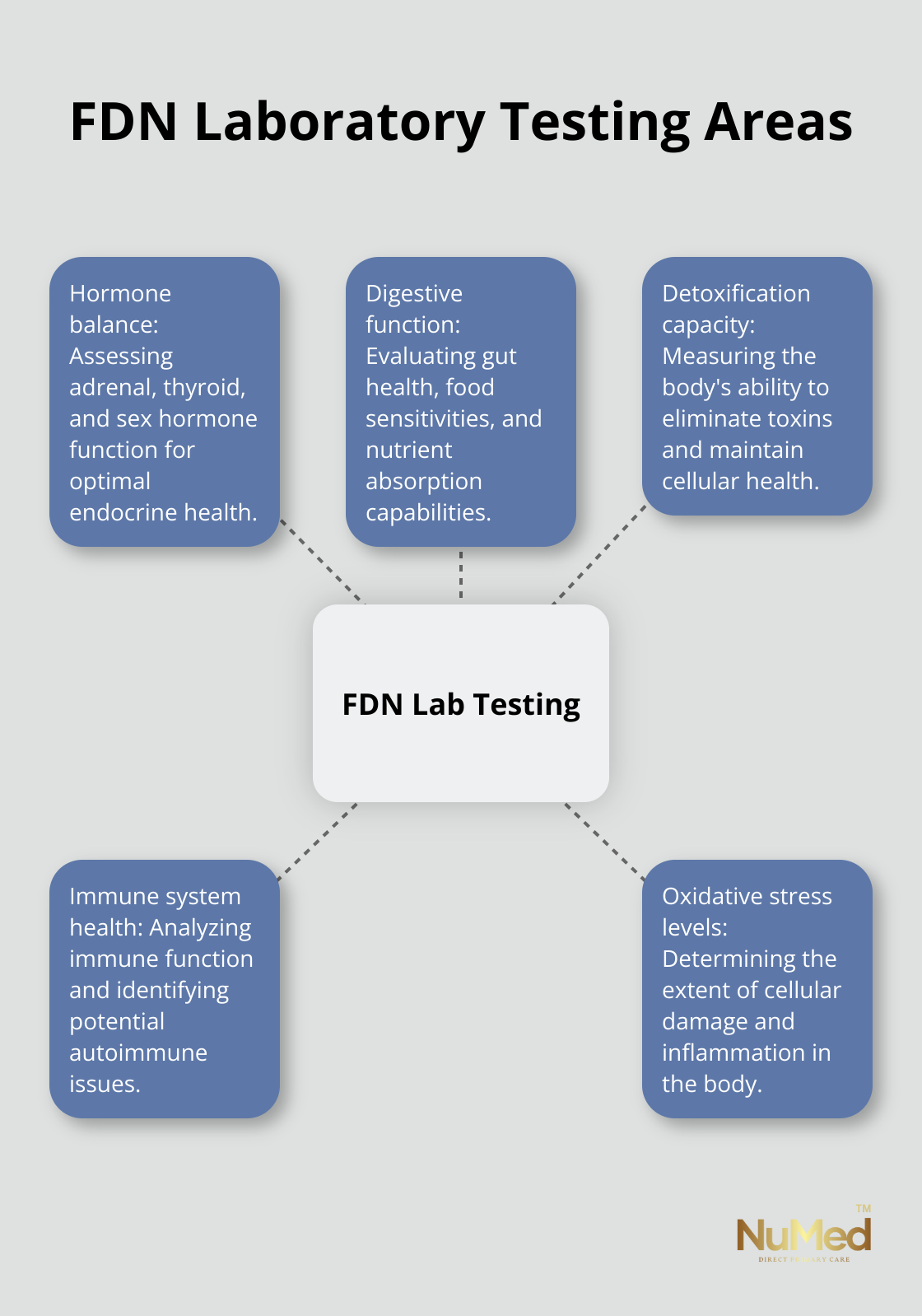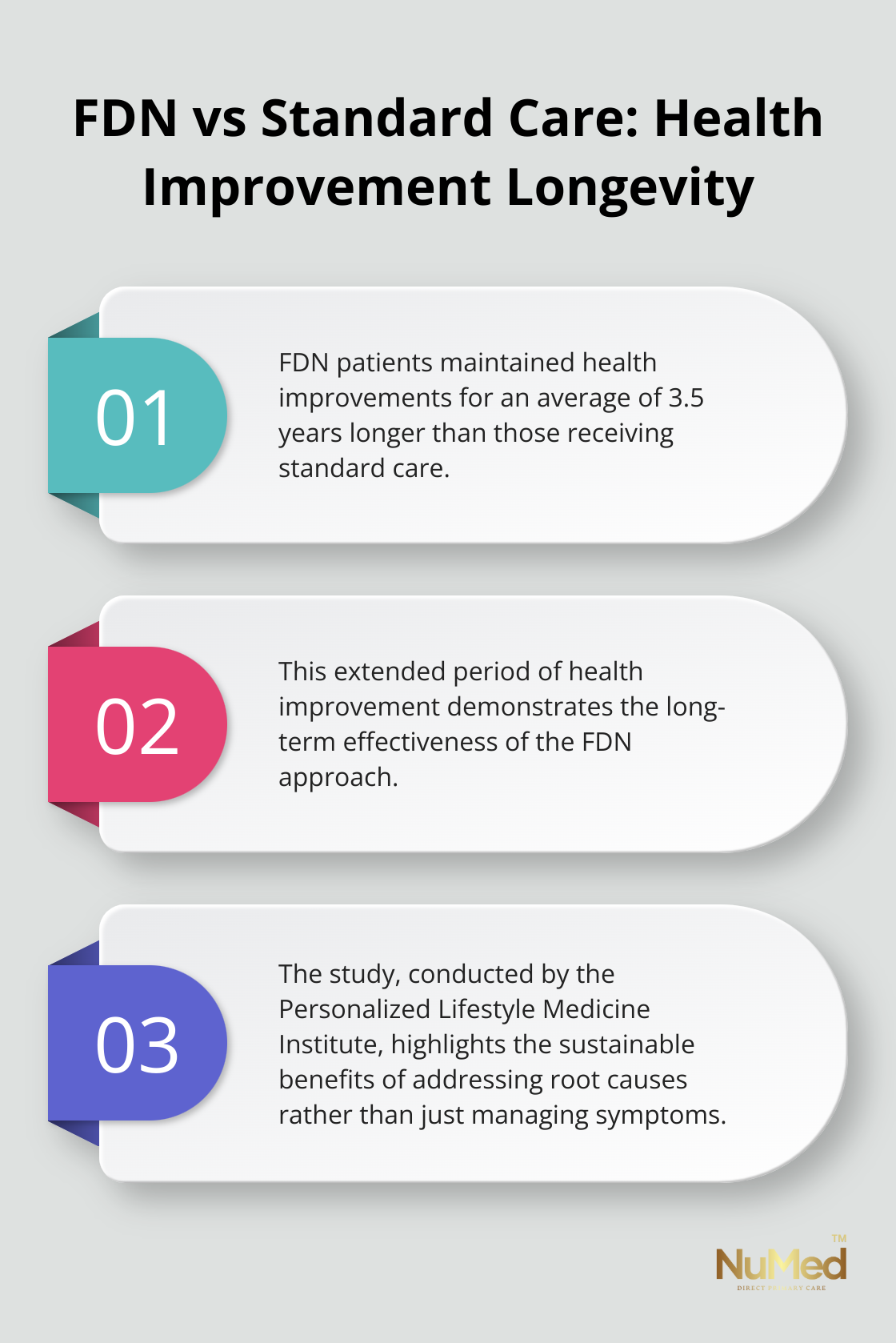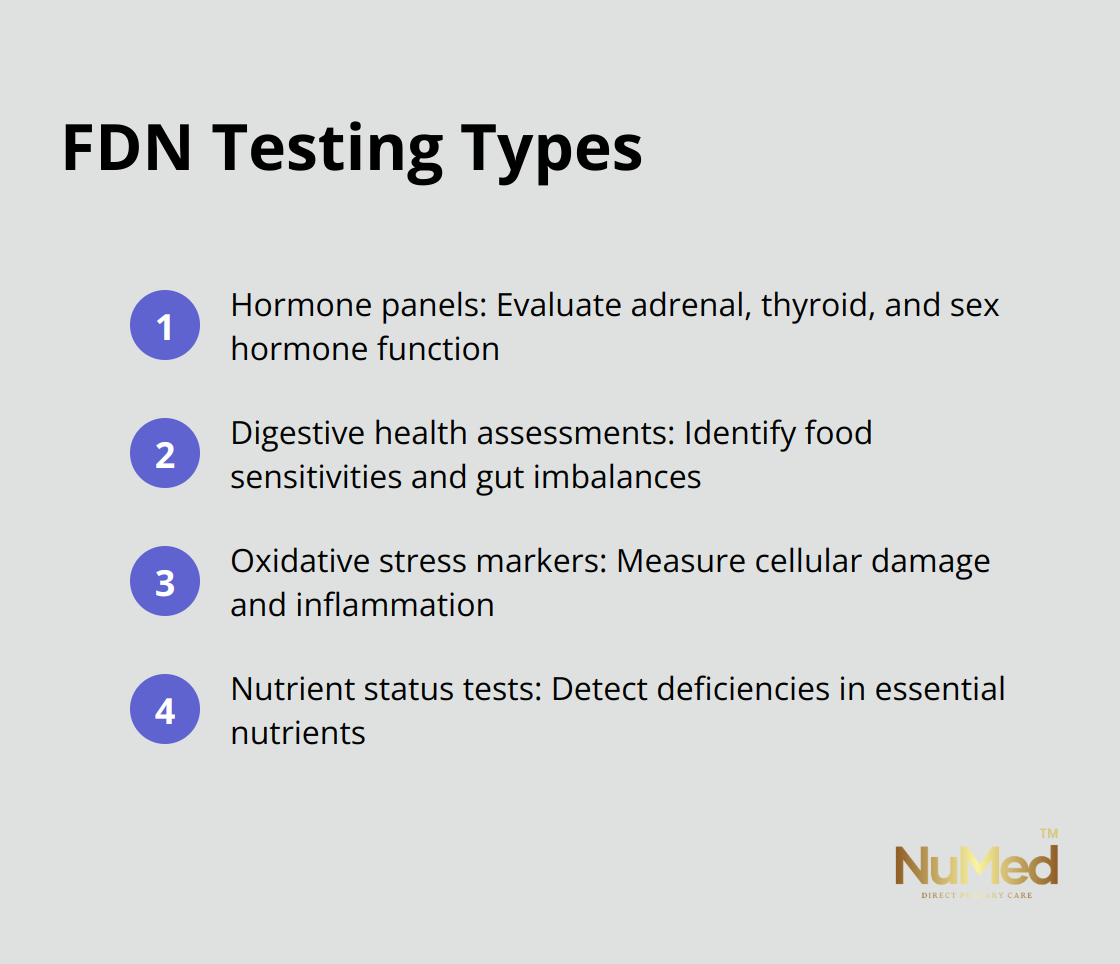At NuMed DPC, we’re excited to explore the world of Functional Diagnostic Nutrition (FDN). This innovative approach to health and wellness goes beyond traditional nutrition methods.
What is Functional Diagnostic Nutrition? It’s a comprehensive system that uses advanced laboratory testing to create personalized nutrition plans. By addressing the root causes of health issues, FDN aims to improve overall well-being and offer long-term health management solutions.
What is Functional Diagnostic Nutrition?
Functional Diagnostic Nutrition (FDN) represents a revolutionary approach to health and wellness that transcends traditional nutrition methods. This innovative system utilizes advanced laboratory testing to uncover hidden stressors and imbalances in the body, enabling practitioners to create highly personalized nutrition and lifestyle plans.
The FDN Difference
FDN distinguishes itself from conventional nutrition approaches by recognizing the uniqueness of each individual’s body. While traditional nutritionists often focus on calorie counting or general dietary guidelines, FDN practitioners acknowledge that people may respond differently to various foods and environmental factors.
For instance, a traditional nutritionist might recommend a low-fat diet for weight loss. In contrast, an FDN practitioner would first conduct comprehensive testing to understand the individual’s metabolic type, hormone levels, and gut health before making any recommendations.
The Power of Lab Testing
Laboratory testing forms the foundation of FDN. These tests provide insights far beyond standard blood work, examining areas such as:

- Hormone balance
- Digestive function
- Detoxification capacity
- Immune system health
- Oxidative stress levels
Practical Applications of FDN
FDN practitioners leverage test data to create targeted protocols. If testing reveals high cortisol levels and poor sleep quality in a client, the FDN approach might include specific stress-reduction techniques, targeted supplements, and dietary changes to support adrenal function and improve sleep.
This data-driven approach allows for precise interventions. Instead of guessing what might work, FDN practitioners can pinpoint exactly what the body needs to function optimally.
FDN in Action
The real-world application of FDN principles can yield impressive results. For example, a client struggling with chronic fatigue and digestive issues might undergo comprehensive testing that reveals gut dysbiosis (an imbalance in gut bacteria) and hormonal imbalances. An FDN practitioner would then create a personalized protocol that might include:
- Specific probiotic strains to rebalance gut bacteria
- Targeted supplements to support hormone production
- A customized elimination diet to identify food sensitivities
- Stress-reduction techniques to support overall healing
This tailored approach (based on individual test results) often leads to more effective and lasting results compared to generic health advice.
As we explore the key benefits of Functional Diagnostic Nutrition in the next section, you’ll discover how this personalized approach can address the root causes of health issues and improve overall well-being.
Why FDN Transforms Health Outcomes
Precision in Nutritional Guidance
Personalized nutrition (PN) aims to provide tailored dietary recommendations to improve a person’s health outcomes by integrating a multitude of individual factors. This approach revolutionizes health and wellness with its data-driven methodology. Advanced lab testing enables unprecedented accuracy in nutritional recommendations.
Uncovering Hidden Health Obstacles
FDN excels at identifying underlying health issues that often escape detection in standard medical screenings. Evidence supporting the functional model in chronic pain is still in its infancy, but there is growing research in this area.
A case study illustrates this point: A 45-year-old woman suffered from unexplained weight gain and mood swings. Traditional tests showed nothing abnormal, but FDN testing revealed a hidden thyroid imbalance and estrogen dominance. Addressing these root causes resulted in a 20-pound weight loss and significant mood improvement within three months.
Long-Term Health Optimization
FDN’s focus on addressing root causes (rather than just managing symptoms) leads to more sustainable health improvements. A longitudinal study conducted by the Personalized Lifestyle Medicine Institute found that patients who underwent FDN protocols maintained their health improvements for an average of 3.5 years longer than those receiving standard care.

This long-term success stems partly from FDN’s emphasis on patient education and empowerment. Practitioners don’t just hand out meal plans; they teach patients how to understand their body’s unique needs and make informed decisions about their health. This knowledge becomes a powerful tool for ongoing health management, reducing the likelihood of future health crises.
Personalized Treatment Plans
FDN practitioners create highly individualized treatment plans based on comprehensive test results. This personalized approach often leads to more effective outcomes than one-size-fits-all solutions. For example, two patients with similar symptoms might receive entirely different protocols based on their unique test results, leading to more targeted and effective treatments.
Holistic Approach to Wellness
FDN takes a holistic view of health, considering not just nutrition but also lifestyle factors, stress levels, and environmental influences. This comprehensive approach allows practitioners to address multiple aspects of a patient’s health simultaneously, leading to more profound and lasting improvements.
As we explore the practical implementation of Functional Diagnostic Nutrition in the next section, you’ll discover how this innovative approach translates into real-world health solutions.
How FDN Works in Practice
The FDN Testing Process
Functional Diagnostic Nutrition (FDN) relies on advanced laboratory testing to uncover hidden health issues. FDN practitioners use various tests to assess different aspects of health:

- Hormone panels (evaluate adrenal, thyroid, and sex hormone function)
- Digestive health assessments (identify food sensitivities and gut imbalances)
- Oxidative stress markers (measure cellular damage and inflammation)
- Nutrient status tests (detect deficiencies)
These tests provide a wealth of data that forms the foundation of the FDN approach. The DUTCH test may be a helpful tool for gaining insights into hormone metabolism, particularly for cortisol, estrogen, and progesterone. This level of detail allows for more targeted interventions.
Crafting Personalized Protocols
FDN practitioners analyze test results to create individualized protocols. This process identifies patterns and connections between different health markers. For instance, if testing reveals high cortisol levels and low DHEA, along with gut dysbiosis, the practitioner might focus on stress reduction techniques and gut healing protocols simultaneously.
The specificity of this approach sets it apart. Instead of generic advice like “eat more vegetables,” an FDN protocol might recommend specific types of vegetables based on your unique digestive capacity and nutrient needs.
Lifestyle and Dietary Modifications
FDN protocols often involve significant lifestyle and dietary changes. These aren’t one-size-fits-all recommendations but tailored adjustments based on individual test results and health goals. Examples include:
- Sleep optimization strategies based on cortisol rhythm test results
- Specific exercise recommendations that align with hormone profiles
- Targeted supplement protocols to address nutrient deficiencies
- Customized meal plans that consider food sensitivities and metabolic type
Practitioners implement these changes gradually, with close monitoring and adjustments as needed. The goal is sustainable, long-term health improvement (not quick fixes).
The Practitioner-Patient Partnership
Working with an FDN practitioner is a collaborative process. FDN emphasizes patient education and empowerment. Practitioners explain test results, teach patients about their body’s unique needs, and provide tools for long-term health management.
This partnership approach leads to better outcomes. A study published in the Journal of Patient Experience found that patients who felt actively involved in their healthcare decisions reported 19% higher satisfaction rates and were 28% more likely to adhere to treatment plans.
FDN practitioners also provide ongoing support and adjustments. As the body begins to heal and balance is restored, follow-up testing helps fine-tune the protocol. This iterative process ensures that the treatment plan evolves with the patient’s changing health status.
Final Thoughts
Functional Diagnostic Nutrition represents a paradigm shift in healthcare, offering a data-driven approach to personalized wellness. This innovative method utilizes advanced laboratory testing to address the root causes of health issues, providing a comprehensive framework for long-term health management. FDN empowers individuals with knowledge about their unique biochemistry and nutritional needs, moving beyond mere symptom treatment.
The future of healthcare will likely move towards more personalized, preventative approaches, with FDN at the forefront of this evolution. FDN combines cutting-edge science with holistic health principles, and as research in personalized nutrition advances, we can expect even more refined and effective protocols. At NuMed Primary Care, we incorporate FDN principles to provide comprehensive, patient-centered healthcare.
Our direct primary care model focuses on preventing illness by addressing root causes and fostering a personalized connection between patient and practitioner. We offer extensive lab services, functional medicine approaches, and health coaching to tailor treatments to each patient’s unique needs (aiming for optimal health outcomes). Understanding what Functional Diagnostic Nutrition is and how it can benefit you proves essential in today’s health landscape.
















